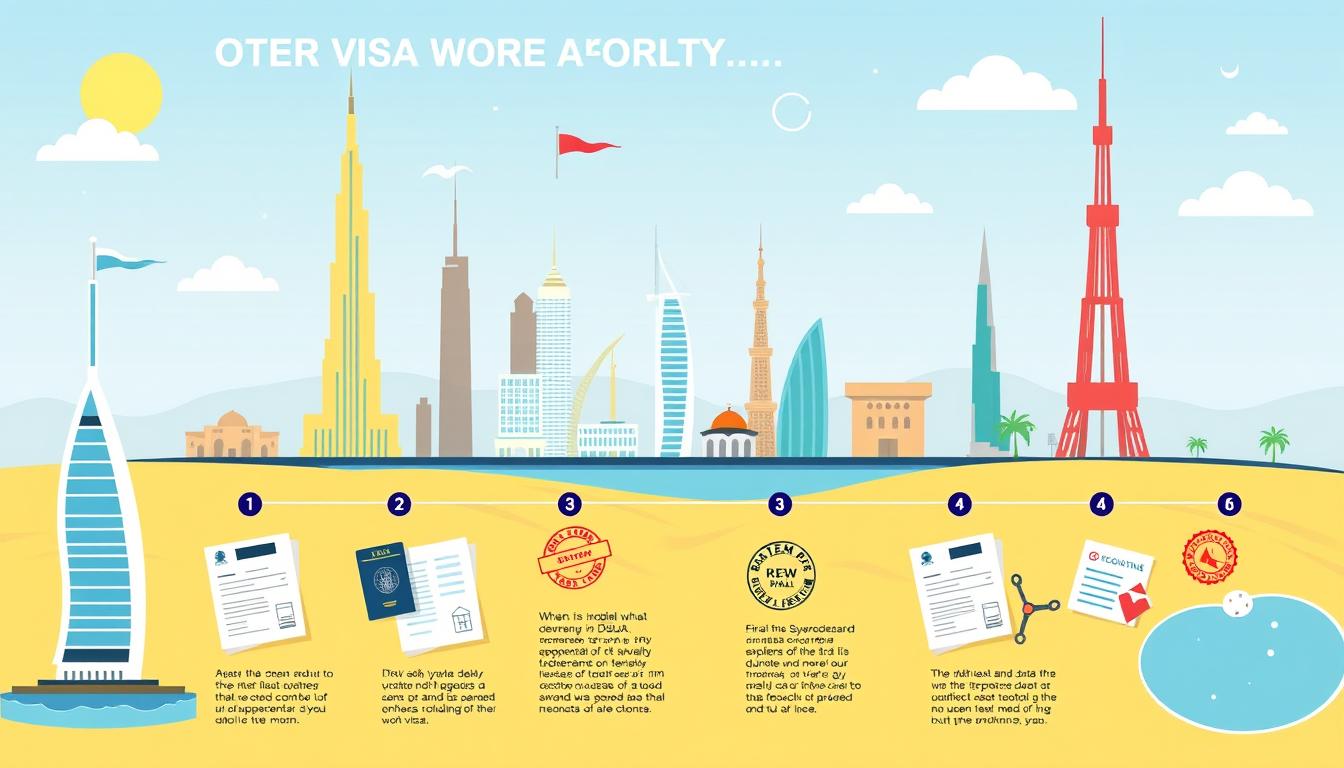Step-by-Step Guide to Getting a Dubai Work Visa

Step-by-Step Guide to Getting a Dubai Work Visa
Imagine standing at the top of the Burj Khalifa. From there, you look over Dubai’s shiny skyline, and your career dreams seem close. This city is a mix of old and new and offers many chances for growth. It lures people with tax-free money, lots of job chances, and an exciting life among other expats. Moving to a new place can make you feel excited and nervous at the same time.
To turn your dream into reality, getting the right work visa is key. The rules for UAE work visas keep changing, so it’s important to know how to apply. The process might seem hard, but with this guide, you’ll learn what you need to make your move to Dubai smooth. We’ll look at the different types of visas, what you need for your application, and helpful tips.
Key Takeaways
- The UAE offers three main types of employment visas: Standard Work Visa, Green Visa, and Golden Visa.
- Eligibility for the Green Visa includes a minimum annual income of AED 360,000 for freelancers or a minimum monthly salary of AED 15,000 for skilled employees.
- The visa application process generally takes 2-5 working days for updates on the visa status.
- It is essential to understand specific fees associated with visa cancellation processes, which may include Request Fee and eService Fee.
- Employees in the UAE are entitled to end-of-service benefits requiring gratuity payments for those who’ve completed over a year of continuous service.
Introduction to Working in Dubai
Dubai is known for its lively job scene. It attracts professionals from all over seeking fulfilling careers. Opportunities are vast in sectors like finance, tech, healthcare, and engineering. Living in Dubai means enjoying tax-free earnings, experiencing diverse cultures, and high living standards.
If you’re planning to work there, knowing the employment laws is key. The city’s expat community is huge, offering a unique mix of cultures. This diversity leads to innovation and could boost your career. The job seeker’s guide to Dubai covers everything from applying for jobs to understanding local life.
The work culture in Dubai is exciting. It promotes learning and skill development. The nation values talent, offering various visas for different careers. It’s important to understand the visa requirements before you move. This knowledge will make working in Dubai a smoother experience.
Types of UAE Employment Visas
If you’re planning to work in the UAE, knowing about the employment visas is important. There are three main types of visas, each designed for different professional needs.
Standard Work Visa is common and perfect for people hired by a specific company. It usually lasts two years. You can only work for the company that sponsors you. To get this visa, you must have a job offer from a UAE company.
Green Visa started in 2022 for skilled pros, freelancers, and investors. It lets you stay for five years without needing an employer to sponsor you. It’s great for expats who want to build their careers freely. This visa strengthens your ability to live and work in the UAE independently.
Golden Visa is for those with a lot of money, offering ten-year residency. It lets you live, work, and study in the UAE with many benefits. You don’t need a local sponsor. This visa is perfect if you want to invest in the UAE.
Each visa type has its own requirements based on your skills and the visa you want. Knowing the differences between these visas can help you choose the right one for your career in the UAE.
Dubai Work Visa Guide
Understanding the different work visas in Dubai is key if you’re aiming to work in the UAE. Each visa has its benefits and requirements, fitting various jobs and contracts. This guide will help you figure out your best option.
Standard Work Visa
The Standard Work Visa is needed for expats in regular jobs in Dubai. It requires a local employer’s sponsorship and following UAE labor laws. Getting a work permit is part of the process, usually taking about two months. This visa lets you live and work in the UAE legally.
Green Visa
The Green Visa is for freelancers and self-employed people, offering work flexibility. It allows you to bring your family and suits those with proof of income and the right qualifications. Unlike the Standard Work Visa, the Green Visa supports self-led business activities.
Golden Visa
The Golden Visa targets highly skilled professionals and investors, valid for ten years. It allows family sponsorship and benefits those investing in real estate or contributing to certain sectors. To get this visa, you need to invest significantly, appealing to those aiming for Dubai residency permits and wanting to contribute to the community.
| Visa Type | Duration | Sponsorship Required | Eligibility |
|---|---|---|---|
| Standard Work Visa | 2 years (renewable) | Yes | Employment with a local employer |
| Green Visa | 5 years (renewable) | No | Freelancers, self-employed individuals |
| Golden Visa | 10 years (renewable) | No | Highly skilled professionals with significant investments |
Choosing the right Dubai work visa involves looking at your career goals and background. Matching your aspirations with the Dubai work visa guide is crucial for a successful future in this vibrant place.
Visa Requirements for Dubai Work Visa
Getting a Dubai work visa depends on knowing certain rules. You need to know about the Dubai visa requirements. These include rules and papers needed for both local and overseas applicants. Getting these ready ahead of time makes the process faster. This ensures you can start working in Dubai without delays.
General Eligibility Criteria
To get a Dubai skilled worker visa, there are some rules you must follow:
- Age requirement: You must be 18 or older.
- Educational qualifications: You need to show relevant school records.
- Job offer: You must have a job waiting for you at a legal Dubai company.
- Compliance with MoHRE standards: You must fit the Ministry of Human Resources and Emiratisation criteria.
Mandatory Documents
For your Dubai work visa application, you’ll need these papers:
- Valid passport: It should be valid for six months from when you apply.
- Passport-sized photographs: They should meet the UAE’s picture rules.
- Entry permits: You need permits from your job or sponsor.
- Medical clearances: You must show you’re healthy enough to work.
- Proof of employment: This includes your job offer letter or contract.
- Health insurance: You need proof of health coverage for your stay in the UAE.
| Visa Type | Stay Duration | Validity | Fees (AED) |
|---|---|---|---|
| Single entry Normal | 90 days | 58 days | 18,000.0 |
| Single entry Normal | 4 days | 58 days | 5,026.0 |
| Single entry Express | 4 days | 58 days | 5,904.0 |
| Single entry Normal | 14 days | 14 days | 8,784.0 |
| Single entry Express | 29 days | 58 days | 6,730.0 |
| Single entry Normal | 29 days | 58 days | 5,852.0 |
| Multiple entry Normal | 90 days | 58 days | 38,226.0 |
Make sure to have all the right documents and meet the eligibility to boost your chance for a successful Dubai work visa application.
Step-by-Step Visa Application Process
The process to apply for a visa is key for a smooth start in Dubai. Each step is important to get your work and living status set. Knowing what to do at each stage helps you plan and act efficiently.
Entry Visa Quota Approval
Getting entry visa quota approval from the Ministry of Labour is the first step. Employers need to request this approval, taking around four to five days. This confirms the number of foreign workers they can hire.
Submitting Employment Contract
Then, it’s important to submit your signed employment contract. UAE law requires this, and it usually takes two days to process. Getting this right avoids delays later on.
Work Permit Application Process
After the contract is in, applying for a work permit is next. The Ministry checks your contract and documents before giving a permit, needing three to five days. Knowing this helps plan your next moves.
Medical Tests and Health Insurance
Medical tests ensure you’re fit to work and often have same-day results. Also, UAE law requires expatriates to have health insurance. Handling these health tasks quickly helps you start working sooner.
| Step | Details | Estimated Duration |
|---|---|---|
| Entry Visa Quota Approval | Employer submits request to hire foreign employees. | 4-5 days |
| Submitting Employment Contract | Signed contract confirming job terms submitted to authorities. | 2 days |
| Work Permit Application Process | Submitting required documents for work permit approval. | 3-5 days |
| Medical Tests | Medical fitness assessment required for visa application. | Same day for results |
| Health Insurance | Legal requirement for expatriates in UAE. | Varies |
Understanding the visa application steps helps comply with UAE law and keeps you informed. This ensures a smooth transition to your new life and work in Dubai.
Navigating Dubai Visa Requirements
Navigating Dubai visa requirements can seem tough, especially for those new to expat life in Dubai. Learning about the different rules and steps makes applying easier. Always keep up with any changes in visa policies since they affect your plans.
Talking with your employer about your work visa sponsorship is key. Talk about costs and what documents you need to avoid surprises. Some find issues because their paperwork is incomplete or they didn’t understand sponsorship rules. This can cause delays or even rejections.
When applying for a work visa, make sure you have all needed documents ready. This includes a valid passport, results of a medical fitness test, and your job contract. Work visa costs start at AED 700, but tourist visas are cheaper, ranging from AED 200 to AED 500. The time to process these can vary, so plan ahead.
It’s also vital to know how long different visas last. The EEP (Employment Entry Permit) is good for 60 days. The Employment Residence Visa usually allows you to stay for 2 or 3 years. Make sure your paperwork matches these timeframes for an easy start in your new job.
Remember, there’s a grace period of 30 to 90 days for finding a new job or leaving the UAE after your job ends. This gives you time to change your plans without hurry. For healthcare workers, you must get the right licenses, which also affects the visa process.
Being informed and organized helps you tackle Dubai visa requirements with ease. This lets you enjoy your new work and life in Dubai without worry.
Checking Visa Status and Validity
Knowing your visa status and keeping it valid is very important in the UAE. Updating yourself on Dubai visa rules can prevent legal issues. There are several ways to check your visa status, like official websites or helplines. This knowledge helps you handle your residency better.
How to Check Your Visa Status
To check your Dubai visa status, go to the General Directorate of Residency and Foreign Affairs (GDRFA) website. You’ll need to input your Residence Visa File Number, full name, gender, and birth date. This will show key info like your visa’s expiry date and status.
For visas from other Emirates like Abu Dhabi, Sharjah, or Ajman, visit the Federal Authority for Identity, Citizenship’s (ICP) website. Here, you need your passport number, its expiry date, and your nationality. To track your visa application, enter your application and reference numbers on the same site.
If you need more help, calling dedicated helplines is useful. For general questions, dial 600-522-222 for visa details by passport number or call 800-5111 for help from the Amer Centre offline.
Updating Visa Information
Changes in your job or personal details mean you need to update your visa info. If required, use your Emirates ID for visa validity checks through the ICA smart services. Regular checks help avoid fines for overstaying, which is AED 50 per day.
The GDRFA Dubai app is a convenient option for checking your visa status at any time. Make sure to renew your visa before it expires to dodge fines and legal troubles.
Understanding UAE Labor Laws
Learning the basics of UAE labor laws is essential for those in Dubai. It helps to know about rights and duties for a safe workplace. Let’s look at important parts of the laws, such as salary rules, anti-discrimination, and how jobs can end.
Employee Rights and Obligations
It’s important for workers to know their rights in the UAE. Key areas include:
- Salary Protections: Employers must pay on time and follow the rules for the lowest pay allowed.
- Discrimination Laws: Workers have rights against unfair treatment because of gender, nationality, or religion.
- Termination Conditions: Workers should understand legal reasons for being fired and how much notice is needed.
Working Hours and Leave Policies
Knowing about work hours is key. The UAE sets a limit of 48 hours a week over six days, including paid extra time. Here’s what you should know about time off:
| Type of Leave | Duration | Details |
|---|---|---|
| Annual Leave | 30 Days | After working for a year. |
| Sick Leave | 90 Days | Full pay for the first 15 days, then half. |
| Maternal Leave | 60 Days | Paid, with special rules for new moms. |
| Public Holidays | Varies | Set by the UAE government. |
Following these rules protects your rights and makes work fair. Being aware and active helps you and your boss, keeping work in the UAE fair for everyone.
Common Pitfalls and Visa Fraud Prevention
Applying for a Dubai visa comes with challenges. Many expats fall for scams through unofficial channels. Watch out for job offers that seem too good to be true. Real jobs come from reputable sources.
It’s important to avoid identity theft. A British man was tricked, leading to a £600,000 loss. Always check who is asking for your personal info.
Simple mistakes can cause visa denial. Wrong names or birth dates are common errors. Always give full and clear job information. Make sure your documents are readable to avoid application failure.
Young women under 25 might face extra checks. Applying during busy times can also delay or deny your visa. Submit your application early and ensure your documents are correct to avoid these issues.
To improve your visa chances, get help from recognized agencies.
| Common Pitfalls | Visa Fraud Prevention Strategies |
|---|---|
| Trusting unofficial job offers | Use verified recruitment agencies |
| Errors in personal details | Double-check all entries for accuracy |
| Incomplete document submissions | Prepare a checklist of required documents |
| High application volume during peak seasons | Apply during off-peak times |
| Submitting unclear scanned copies | Ensure high resolution and legibility in scans |
Staying alert to these issues can help your Dubai visa application succeed. Knowing the process helps you make better decisions, ensuring a easier move to your new job in Dubai.
Conclusion
Getting a Dubai work visa is key for anyone aiming to work in this lively market. This guide has shown you different visa types, such as the standard, green, and golden visas. It also covered what documents you need and how to apply. Knowing these steps helps make moving and working in the UAE easier.
Starting your new job in Dubai is exciting. Make sure to understand UAE labor laws, including your rights, working hours, and vacation policies. This knowledge helps whether you’re getting a two-year work permit or seeking residency. Being informed is your best tool during this process.
Dubai is home to people from over 200 countries, offering many opportunities. Before moving, think about living costs and if your salary matches. Programs like “Remote Work from Dubai” have specific income requirements. With this advice, you’re ready to succeed in a tax-friendly and vibrant place.
FAQ
What types of visas are available for working in Dubai?
In Dubai, you can get three main types of work visas. The Standard Work Visa is the most common for jobs. The Green Visa suits skilled pros and freelancers. The Golden Visa is for wealthy folks and investors.
What are the general eligibility requirements for a Dubai work visa?
To get a Dubai work visa, you need to be older than 18. You must have the right educational background. Also, you need a job offer from a UAE recognized employer.
How long does it take to process a Dubai work visa?
Getting a Dubai work visa can take from 2 to 4 weeks. It depends on your documents and the type of visa you want.
Do I need health insurance to work in Dubai?
Yes, you need good health insurance to work in Dubai. It’s a must for your visa application.
How do I check the status of my Dubai work visa?
To check your Dubai work visa status, go to government sites like the GDRFA. Use your visa number or application info.
What should I do if I need to update my visa information?
If your job or personal info changes, tell the UAE officials fast. You’ll need to give them updated documents.
What are my rights as an employee in Dubai?
As an employee in Dubai, the UAE labor laws protect you. You get salary security, anti-bias rules, and fair work hours and leave.
How can I avoid visa fraud when applying for jobs in Dubai?
Avoid visa scams by researching jobs and checking with official sources. Use recognized recruiters. Watch out for fake job ads and weird payment requests.




